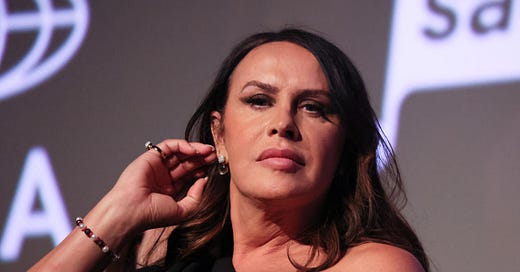Emilia Pérez and its star fail to deliver
While the film and Karla Sofía Gascó fall short in properly displaying the sociopolitical struggle at the heart of transgender rights, it does not mean the next film in a similar vein will do the same
The path was clear. An embarrassment of riches coming out of the Festival de Cannes (Cannes Film Festival). Think of films like “All About Eve (1950)”, “L’Avventura (1960)”, “Tropical Malady (2004)”, and even more recently, “EO (2022)”. These are some of the many celebrated films that call themselves Cannes Jury Prize winners. “Emilia Perez (2024)” is now part of that award’s history.
If that is not enough to emphasize the eagerness of this film heading into last summer, we can look to how the four central actresses (Zoe Saldana, Karla Sofía Gascón, Selena Gomez, and Adriana Paz) in the film fared at Cannes. Not one, not two, not even three, but all four of them found themselves sharing the award for Best Actress. Astounding statement of intent from the jury.
Shortly after Cannes, you then had the juggernaut that is Netflix buy the rights to the film for $12 million (regardless of what has occurred recently, it is not bad business to almost have one Oscar nomination for every $1 million spent). The societal and award-season reckoning that is “Emilia Perez” was set. Led by their glimmering, inspiring star that Gascón represented. The concluding reckoning looks to be in an ill-fated nature that will hang around those for years to come.
A little over 30 minutes into Jacques Audiard’s “Emilia Pérez,” we find ourselves listening to the last words of Manitas before his transition in becoming Emilia in the song “Deseo.” In what is as stark of an example as we have seen in recent awards season history, this Oscar campaign for Gascón and the film is anything but their deseo.
It is undeniable that the figure of Gascón and her role in the film are intrinsically embroiled. In what was once its biggest selling point, you had Gascón portraying a character that, from a 30,000-foot view, idolized the continuing struggle for transgender rights and liberation in society.
If you connected to the bold story and figure of Emilia or found the portrayal in bad taste and offensive, it was and still is Gascón at the heart of your critique. Now, you find the inverse out of those initial benefits of having a symbiotic relationship between your film and lead figure.
Unsurprisingly, the formulaic attempts from Gascón to defend her previous social media behavior did not quell any of the controversy surrounding her and the film. Combined with her online attempts, her recent hour-long interview with CNN left general audiences unmoved and apathetic to any further attempts to defend her past.
As long as there is film and art, there will be celebration and controversy at every step. In normal circumstances, and as we have seen for decades, you would not fault Netflix for their frivolous attempts to distance themselves from Gascón.
Will this be enough for the streamer to still walk away from this year’s award season with a few more award triumphs to their name? Maybe. You never do, truly, know with the Academy voting body. Still, that line of thinking is missing the point moving forward.
Is Gascón in the unequivocal wrong for her past actions and pitiless attempts to correct them? Yes. Will “Emilia Perez” be remembered as a film uninvitingly and falling short of its artistic goals? At this point, it is difficult to say no.
Nonetheless, the turmoil orbiting around this film and its star cannot dissuade big studios and streamers alike from taking chances on movies and stories like this in the future. While “Emilia Perez” and Gascón fall short in suitably displaying the sociopolitical struggle at the heart of transgender rights–it does not mean the next film in a similar vein will do the same.
Perchance, it invigorates general audiences and opens eyes to what the power of film can do to change minds.
In hindsight, I cannot fault the jury at Cannes too much for their artistic misjudgment. There is a world where the story of “Emilia Perez” could be told in an “original and bold” way. Now we know, it was not this one.
On the other hand, I can fault them heavily in elevating this film more than it actually portrayed on-screen. That it was the lowest of hanging fruit and a complete misfire in what it attempted to portray, and simply not being a very good film. However, you cannot deny that the importance of transgender rights was worth magnifying at the time and even more so as we proceed into the next quarter of the 21st century.
The challenge does not fall on filmmakers and performers in telling these types of global stories and livelihoods. The burden must be on the people who fund these projects, advertise these projects, and display these projects to find the best of them out there.




